- Home
- M. D. Lachlan
The Night Lies Bleeding Page 3
The Night Lies Bleeding Read online
Page 3
‘Are they ordering me to go?’
‘No, but they have no objection if you do.’
‘Unfortunately, gentlemen, it is quite out of the question. My work here is valuable.’
‘More valuable than the people who are being killed?’ said Balby.
Again, Craw raised the eyebrow, what the Romans had called the supercilium, from where we get ‘supercilious’. Balby did not know the word, nor its derivation, but he had no doubt of the meaning of the gesture.
Craw shrugged and said, ‘Qu’importent les victimes, si le geste est beau?’
For a second he had forgotten the company – honest, simple, working men, not the slightly too-sophisticated aristocrats he chose for friends. Quoting the opium-addicted anarchist poet Tailhade at policemen was unlikely to endear them to him, even – or especially – if they were familiar with the man’s work.
‘Hark at Charles de Gaulle,’ said Briggs.
‘I’m afraid neither of us have the benefit of your education, sir,’ said Balby.
‘Something about the enduring power of beauty. I’m needed here. Do you know what I do, I …’
Now it was Balby’s turn to raise his eyebrows. Craw felt mildly ashamed of his condescension and stopped mid sentence. Why did he feel the need to justify himself to this man? It was as if Balby’s quality of attention was so strong that it pulled you in like a current, forcing you to join his examination of yourself. Craw’s words sounded pat and unconvincing, even to him.
‘We’d like you to look at something else,’ said Balby.
Briggs reached into his suit pocket and took out a bulging envelope. Craw noted that the smell of blood became stronger, but this wasn’t the smell that drifted through the windows, stuck to the furniture and tapped at his palate – the blood of fear. This had a different note, different secretions and sediments. Craw read it exactly: excitement.
Briggs slid the envelope across the table. Craw opened it. Whatever was inside had spent some time immersed in blood. If Briggs had been disappointed at the academic’s reaction to the photographs, he was astounded now. All the colour seemed to drain from Craw’s face as he looked at the item in front of him.
Craw felt terribly light-headed, but he didn’t know why. It was as if his memories were submerged in a filthy lake, trying to make the surface, but as much as he tried to reach down and pull them out, they slid from his grasp. Something inside him was searching to connect, an electric charge in his head building and looking for a point to which it might leap to fuse a gap to form a bridge of memory.
Craw swallowed to compose himself. He examined the envelope’s contents. It was a pebble, small and triangular. The policemen were surprised to see him pick it up and sniff at it. He detected the residue of that eager blood he had smelled earlier and something else – new leather, wet leaves, sandalwood, even.
He looked at the pebble and had a feeling as if he had encountered someone he had known for years but whose name he could no longer remember. How can you forget the most important moments of your life? Easily. Can you remember your birth? What of Craw, who had been born a man, become a wolf, been reborn a man and reborn a wolf, and reborn a man again? What had the trauma of his formation and reformation done to his memories? You cannot recall your nursery but, standing in it at age twenty, might you not find it strangely familiar?
On the pebble was scratched a motif, or rather the remains of a motif. Someone had spent some time scratching out the majority of the design. All that was discernible was the representation of a hand, though that too bore several scores across it, as if someone had been interrupted while trying to erase it. Craw was intrigued. In just a few lines the artist had managed to catch something in the shape and position of the fingers. The hand seemed to him to reflect tension, or a fight against tension – the fingers were curling over into a fist, the thumb seemed at an unnatural angle.
‘It was associated with one of the bodies,’ said Balby. ‘It seems to be some sort of primitive art.’
Craw heard his own voice speaking, although his mind was racing, trying without success to work out where he had seen something like this before.
‘Neo-primitive. The execution is impressive. This is the work of someone with a good eye.’
‘But it’s primitive? Caveman stuff?’ Briggs asked.
‘Neo-primitivism is an art movement of this century,’ said Craw, with a dimssive wave of the hand. ‘This is not old, definitely not old. The rendering is too …’ he searched for the right word, ‘knowing. I’d say it was created within the last thirty years.’
‘So how does it relate to the marks?’ Balby asked.
‘Who is to say that it does? Was it found near one of the bodies?’
‘Yardley, one of the victims, had it in his hand,’ said Balby.
‘Rigor mortis had set in and they had to break his fingers to get it out.’ Briggs seemed to relish the details.
Craw stroked the pebble. He was intrigued. He looked up at the mortals. Craw never knew if there were others like him but, when he’d seen the work of Van Gogh, he had wondered if the artist, too, had borne his condition. There was something in that competition of colours, those swirls and smears that seemed to show how a werewolf saw the world – or rather experienced it, in sights, smells and tastes. To him the policemen’s flesh was alive with sweat, soot, residues of meals and drinks, grease from hair. Their hands were hanging in the smells of trams, trains, tobacconists and newsagents, the soap of washrooms, the bay rum they had splashed under the arms, the talcum powder they had applied to their feet. Their skin gleamed and teemed as the world clung microscopically to them as they passed through it. If he could have painted, he thought, he would have wanted to paint like those bristling self-portraits the Dutchman had produced in the years of his greatest genius.
His senses were becoming acute, but that signified little. The cells of the palate and nose renew themselves most readily – once a fortnight in even ordinary humans. It is there that, as far as he could recall, his encroaching transition first showed itself. How long before the change? Months, perhaps; years, even.
He tapped the pebble and looked at that strange, resonant hand. He felt almost as if he might grasp it and, in so doing, touch something that had been lost to him for a long time. He looked up at the face of the Madonna that seemed to scrutinise him from the wall.
‘For how long do you gentlemen think you might need me?’ he asked.
3 An Accidental Magician
‘This is the life, eh, Gertie?’ said Dr Max Voller to his wife as he reclined in the back of the staff car.
The deep black Mercedes had picked them up in Paderborn and was conveying them the thirty kilometres to Wewelsburg Castle, where Max would begin his new appointment. It was six months before Balby had knocked on Craw’s door, summer, and the German countryside was blooming. The road ran through fields deep with poppies and cornflowers, which Max imagined as the flags of a tiny nation cheering him in to his new life.
He was glad to avoid the train. They had travelled up that way and, the nearer he had come to Paderborn, the more SS had joined the carriage. In his regular army uniform he’d felt conspicuous among the sharp black tunics and jagged rune insignia of the Schutzstaffel – Hitler’s special guard who seemed to be penetrating every aspect of German life – and the arrogant bastards did nothing to make him feel easier.
One, part of a gang of grinning troopers, had even made a pass at Gertie, asking her where she was going and if she was busy that evening. She’d shown him her wedding ring and he’d said it was ‘a pity that such a credit to our race should be with a regular army man’. He’d sat back in his seat and stroked at his collar, drawing attention to the grinning death’s head insignia that marked him out as a concentration camp guard.
Gertie was a credit to the race, for sure, a real stone cold Nordic beauty. Max had been going to say something to the trooper, but she had put the goon in his place.
‘You don’t really know how to approach women, do you? Perhaps you have very little experience of them, given your age.’
The trooper had gone red to his boots, far more embarrassed than he really had any need to be, and Max had suddenly realised how young the SS man was. No more than eighteen, at a push. The sinister uniform had blinded him to the fact that his tormentor was only a boy. Not so Gertie. She was not an unkind woman but, when crossed, she could always put her finger on a weak spot. She had a sensitivity to her; everyone who knew her saw it.
Still, he didn’t need to worry about train louts. It was he who was taking the staff car, swastika pennants fluttering in the breeze, and they who were stuck on the filthy nineteenth-century locomotive that took them up to Wewelsburg.
Gertie smiled at him, a tight and nervous movement of the lips, no more. Part of him felt proud and flattered that he had been able to get the posting, but he knew his wife disapproved of him working with the SS. Still, he told himself he hadn’t actually applied for a job so, in that way, his conscience was clear. He was there essentially because of a bet.
Dr Voller’s old job had been as a doctor at an army clinic in Salzgitter – treating the clap in the artillery garrison defending the steelworks, largely. He worked alongside his friend Dr Arno Rabe and, to lift the boredom on slack days, they would test their debating skills on one another.
The subjects could be frivolous. ‘How did we end up in this shithole?’ was one of them. Arno had argued that the state was stacked against people like them – bright lower-middle-class boys. Max had argued that they were personally responsible, for arsing around too much at medical school.
‘Cheese: An impediment or a help to the National Socialist state?’ was another hot topic. They’d gone on about that for days. Maybe the argument wasn’t so useless after all, because many of the things he’d said against cheese weren’t too far off what the Nazis said about swing music or modern art, two cultural forms Max personally very much enjoyed.
‘Cheese is by nature decayed milk. It represents the corruption of a pure natural German product. Cows are all German, by the way. Note the Friesians.’
‘Cheese is improved and perfected milk. It is Übermilch!’ said Arno, saluting with his outstretched right arm. He’d pulled out his ration book – it was still a novelty then and the allocations were generous.
‘Look,’ he’d said, ‘if you want proof, here it is: “Reich Cheese, Reich Milk, Reich Eggs, available on these, the Egg Coupons of the Reich!” Salute the coupons!’ He’d brought his heels together and shot out his arm. Max had laughed. The Nazis really used those names.
Then had come the debate that had changed his life. ‘It is more important for an argument to be consistent than it is for it to be right.’
Max had reasoned that it is immaterial if an argument is right or wrong. If it is believed, it is right. If it is disbelieved, it is wrong. So an argument that was right in the nineteenth century – the earth went round the sun– was utterly wrong in the seventeenth.
‘Galileo was wrong,’ he’d said. ‘You’re never more wrong than when you’re locked up by the Inquisition.’
Arno, who Max knew well was no Nazi – though, like Max, he was a member of the party because things were a lot easier that way – had said that right and wrong are eternal values.
‘The willingness to endure can change reality,’ he’d said. ‘What if Galileo had given in?’
‘He did give in,’ said Max. ‘He recanted. It made sod all difference in the long run what he did.’
This argument had continued for days and it had begun to occupy a large part of Max’s thoughts, largely because there was nothing else to occupy them. Then he’d read, in an advertisement in a medical publication, that the Ancestral Heritage and Research Teaching Society – the Ahnenerbe – were inviting papers on possible fruitful areas of medical research for military purposes. There was a small prize for the best three papers and, if any submission was of high enough quality, it would receive a research grant.
‘Here we go, Arno,’ Max had said. ‘It is time for our argument to move out of the theoretical and into the experimental. I am about to demonstrate the power of bullshit!’
And so he’d drawn up his paper. As a younger man, before he’d qualified as a doctor, he’d been interested in psychic phenomena – the latent powers of the human brain. One medical degree and a little cold thinking later, he’d come to the conclusion that there were no such powers. Never mind. He had plenty of raw material to draw on.
Years before, when he was sixteen, he had been courting Gertie at her parents’ house. They’d been laughing and joking on the sofa when she had suddenly cried out ‘Bruno!’ Bruno was her dog, a fat black mongrel, shiny as a beetle and, to Max, half as charming. Max liked dogs but this one was a leg-shagger and a threat to his trousers.
‘What about Bruno?’ Max asked.
‘Farmer Volz has shot him! Down in the lane by the sheep pens.’
‘No, he was in the garden when I came in.’
‘I saw it, as clear as I see you, he’s been shot!’ she said. She was red-faced, blotchy and almost hyper-ventilating. It was the hottest day of a hot summer and Max had suspected heatstroke. But Gertie had been dreadfully upset and he’d agreed to go and look.
Sure enough, the dog was missing. He’d followed the lane down to the pens and there he’d found the animal with a gunshot wound in the front left hand side of its skull. The dog had obviously been half hit by a shotgun blast. It wasn’t dead, but it was as good as. The brain was clearly visible. It was breathing but the motor faculties had gone, and there was no hint of recognition in its eyes when he approached.
Max didn’t know what to do. Gertie certainly couldn’t be allowed to see her pet in such a state and, for all he knew, it could take the dog days to die.
He looked around. The farmer had caused this mess and, as far as he was concerned, the farmer could clear it up again. But Volz had legged it. Brave enough to shoot a dog, not brave enough to see its owner’s tears, he thought.
In the end, he’d gone back, broken the bad news to Gertie, consoled her, held her, kissed and comforted her. Her mother had refused to let her go and see the dog – it would be too upsetting, she said. Then he’d borrowed her father’s overalls and gone back with a spade. He had hesitated to kill the dog but he didn’t really see what other course of action was open to him. It had taken all his resolve, but he had finally given Bruno a whack with a spade on the site of the wound. The dog, mercifully, had died almost straight away. Then Max bagged him and buried him in the back garden. Max was a sentimental sort and, though he disliked the dog, he felt sorry for his beautiful young girlfriend. He made her a little cross for the grave and drew a bone on it. She felt his sympathy, as solid as a touch, and the bond had grown between them.
How had Gertie known the dog had been shot? The incident had intrigued the young Max, and he’d started to collect stories of premonitions and sudden realisations that someone was dead. Clocks occasionally stopped at exactly the second a son fell out of the sky in a test aircraft; dogs suddenly howled at the moment their owners had been hit by a tram. Even after his belief in the paranormal had faded he’d continued to collect the stories out of habit. He’d also never quite got round to cancelling his subscription to New Metaphysical Round-Up.
And hadn’t he made a note of it when a woman in Salzgitter told him how she’d had a vision of her husband catching a girder in the head at the moment a careless crane operator had killed him? And weren’t the visions of shamans and magicians all induced by stress and pain – the Red Men lying tethered waterless in the sun for days to see their gods, the Aztec temples dripping with the blood of sacrifice, even the Christian saints communing with the divine in their moments of agony? For his paper, his ‘master-bullshit-work,’ as he’d described it to Arno, he went back to his old file.
Almost all the incidents of sudden realisation of death involved either a severe head injury or very quick denial of oxygen, such as drowning. Well, that was if you looked at it with a certain prejudice – that is, looking for evidence that psychic powers existed, rather than keeping a more open mind. The technical term for this sort of thinking is teleology – coming up with a hypothesis and setting out to find the evidence to prove it, rather than deducing your result from the evidence. He’d buried his doctor’s scepticism and contacted that part of him that still wanted to believe in wonders. He began to ask what mechanism might be at play here that, as the conscious faculties are destroyed, something else for a second finds its voice and can speak over miles of ocean, over intervening mountains or vast deserts. Could this power, he’d thought, be used, trained and harnessed? No, of course not. But you might argue that it could.
What if we could understand what was going on when the everyday brain was destroyed, study the mechanism, and then replicate it in our soldiers without the need for trauma? We’d be able to ditch every radio set in the Reich, have a secure and instantaneous communication network.
Max had laughed even while he was writing this stuff but, then again, he had enjoyed himself and really got into the flow of it. He was in that spot that he sometimes found himself in when playing tennis well – as if it wasn’t really him playing, but as if he was the expression of some external force that wanted the ball to return over the net. The work came easily; the ideas followed one from the other with little direction from himself. It was more as if he was reading the paper than writing it.
When he read it back then, for a second, he even believed it could be true. He’d been very pleased with his efforts and sent them off to the Ahnenerbe.
He’d been expecting, at best, to win enough to take Gertie to dinner. What he hadn’t expected was a job offer.
He’d been invited to take up a research post at Wewelsburg, seconded to the SS and under their orders but not actually part of the organisation. If things went well, the letter said, perhaps membership might be considered at a later date. Professor August Haussmann himself, regional head of the Ahnenerbe, would meet him there to explain his new duties.

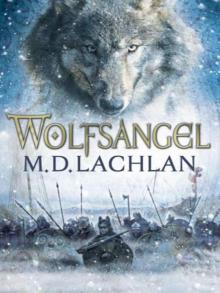 Wolfsangel
Wolfsangel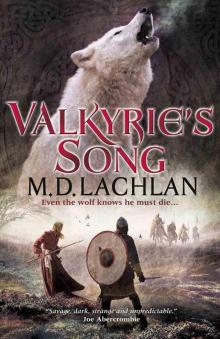 Valkyrie's Song
Valkyrie's Song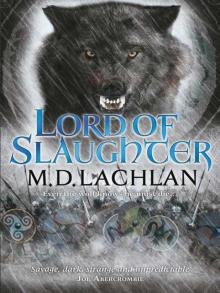 Lord of Slaughter
Lord of Slaughter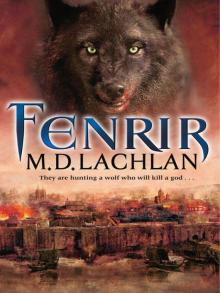 Fenrir c-2
Fenrir c-2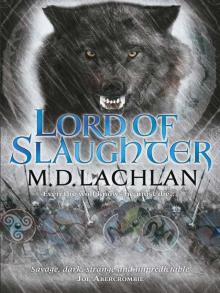 Lord of Slaughter (Claw Trilogy 3)
Lord of Slaughter (Claw Trilogy 3)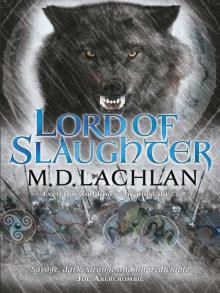 Lord of Slaughter c-3
Lord of Slaughter c-3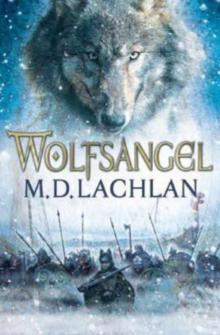 Wolfsangel c-1
Wolfsangel c-1